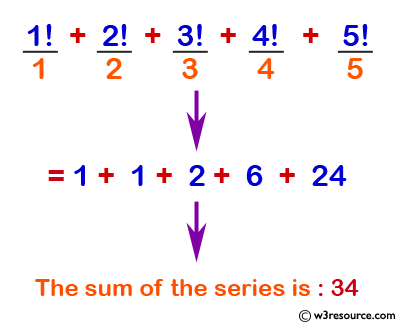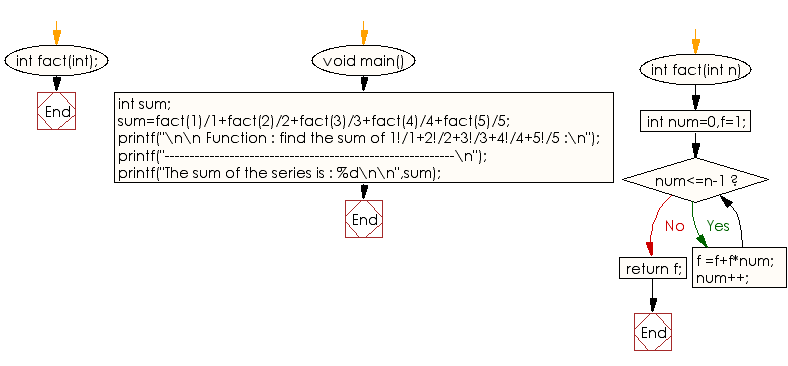C Exercises: Find the sum of specified series
C Function : Exercise-5 with Solution
Write a program in C to find the sum of the series 1!/1+2!/2+3!/3+4!/4+5!/5 using the function.
Pictorial Presentation:

Sample Solution:
C Code:
#include <stdio.h>
int fact(int);
void main()
{
int sum;
sum=fact(1)/1+fact(2)/2+fact(3)/3+fact(4)/4+fact(5)/5;
printf("\n\n Function : find the sum of 1!/1+2!/2+3!/3+4!/4+5!/5 :\n");
printf("----------------------------------------------------------\n");
printf("The sum of the series is : %d\n\n",sum);
}
int fact(int n)
{
int num=0,f=1;
while(num<=n-1)
{
f =f+f*num;
num++;
}
return f;
}
Sample Output:
Function : find the sum of 1!/1+2!/2+3!/3+4!/4+5!/5 : ---------------------------------------------------------- The sum of the series is : 34
Flowchart:

C Programming Code Editor:
Have another way to solve this solution? Contribute your code (and comments) through Disqus.
Previous: Write a program in C to check a given number is even or odd using the function.
Next: Write a program in C to convert decimal number to binary number using the function.
What is the difficulty level of this exercise?
Test your Programming skills with w3resource's quiz.
C Programming: Tips of the Day
Static variable inside of a function in C
The scope of variable is where the variable name can be seen. Here, x is visible only inside function foo().
The lifetime of a variable is the period over which it exists. If x were defined without the keyword static, the lifetime would be from the entry into foo() to the return from foo(); so it would be re-initialized to 5 on every call.
The keyword static acts to extend the lifetime of a variable to the lifetime of the programme; e.g. initialization occurs once and once only and then the variable retains its value - whatever it has come to be - over all future calls to foo().
Ref : https://bit.ly/3fOq7XP
- New Content published on w3resource:
- HTML-CSS Practical: Exercises, Practice, Solution
- Java Regular Expression: Exercises, Practice, Solution
- Scala Programming Exercises, Practice, Solution
- Python Itertools exercises
- Python Numpy exercises
- Python GeoPy Package exercises
- Python Pandas exercises
- Python nltk exercises
- Python BeautifulSoup exercises
- Form Template
- Composer - PHP Package Manager
- PHPUnit - PHP Testing
- Laravel - PHP Framework
- Angular - JavaScript Framework
- Vue - JavaScript Framework
- Jest - JavaScript Testing Framework
